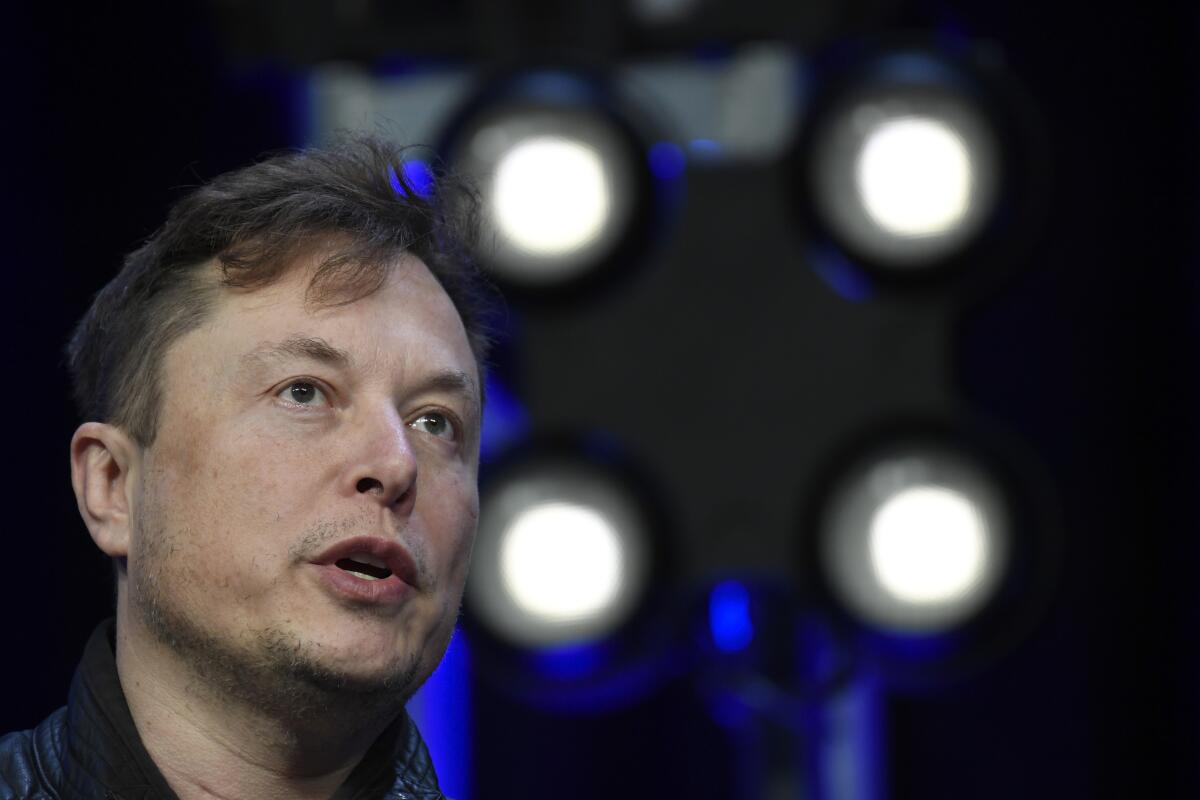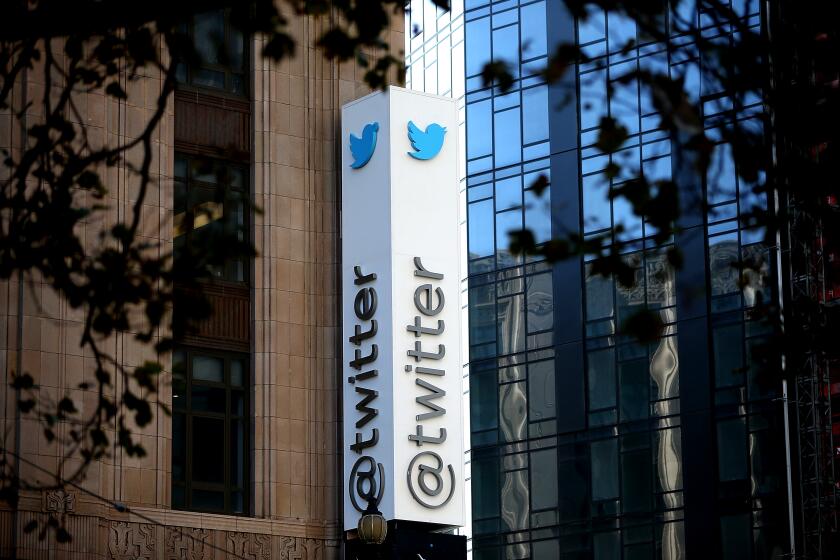For some celebs, pay-to-play Twitter verification is the last straw

- Share via
Is that the real Taylor Swift in your Twitter feed, or just an imposter?
It could soon get a lot harder to tell.
In a move that would upend the social media platform’s relationship with celebrities and other public figures, Twitter’s new owner, Elon Musk, is reportedly planning to turn the site’s account verification system into a paid perk, charging users $19.99 a month to get a blue check mark next to their name.
“$20 a month to keep my blue check?” horror novelist Stephen King told his 6.8 million followers. “F— that, they should pay me. If that gets instituted, I’m gone like Enron.”
The blue checks — something of a status symbol on the platform, where they signal that a user is indeed who they claim to be — are currently available to a host of public-facing users, from household names such as Swift and King all the way down to humble tech reporters.
For those in the public eye, securing a blue check can be key. There are a lot of people looking to impersonate the rich, influential and famous online, including malicious scammers and attention-seeking fans; verification offers a straightforward way of indicating that the account @taylorswift13, for example, is owned by Swift herself.
As Elon Musk completes his acquisition of Twitter, workers debate whether to stay put and await termination or test the job market during a time of hiring freezes and layoffs across the tech industry.
“The blue Verified badge on Twitter lets people know that an account of public interest is authentic,” the San Francisco-based company’s help center explains. “To be Verified, your account must be notable and active.”
Even Musk himself has been targeted by copycats. The Federal Trade Commission has said that impersonators stole about $2 million over the course of several months by advertising crypto scams under the tech mogul’s name.
The purported policy change would come as Musk, the world’s richest man, takes control of the social media platform after a tumultuous, prolonged acquisition process and amid ongoing employee departures.
The billionaire last week fired Chief Executive Parag Agrawal and other top executives; he ousted the company’s board of directors and made himself the board’s sole member, according to a company filing Monday with the Securities and Exchange Commission; and there’s been uncertainty about if and when he could begin larger-scale layoffs.
Indeed, a push for pay-to-play verification could lead to more firings. The Verge reports that Musk has threatened employees with termination if they don’t rapidly turn Twitter Blue — the platform’s $4.99-a-month bundle of bonus features — into a beefier, costlier program that would oversee user verification.
Users who are currently verified would have 90 days to start paying the $19.99 or lose their coveted blue check, the tech publication added. (An earlier report in Platformer, another outlet, claimed that Musk was considering the same change but at the prevailing $4.99 price point.)
Twitter declined to comment on the reported change or say what it might mean for public figures who opt not to buy in.
Some have criticized the blue check mark as elitist.
After “Daily Show” comedian Jaboukie Young-White was temporarily suspended from the platform in 2020 for impersonating CNN, he deemed the verification process “a badge of institutional access,” rather than expertise or influence, which rewards proximity to powerful, predominantly white organizations.
“Yall can keep that s—,” Young-White tweeted Sunday after reports of the $20-a-month fee went public.
The comedian isn’t the only one unenthused by the possibility of a new verification model.
Actor Josh Gad and actress Amber Tamblyn both retweeted Stephen King’s critique of the idea. Longtime vlogger and web personality Hank Green wrote that although he currently pays for Twitter Blue, he’d unsubscribe if it became tied to verification — “because paying for a check mark is 100% cringe.”
“Wonder Woman” actress Lynda Carter posted a picture of herself wearing the superhero’s iconic costume (which she captioned “Twitter with verification”) side-by-side with another photo of herself wearing staid alter ego clothes (“Twitter when I refuse to pay $20 a month for it”).
Actor Kevin Kreider, who has a verified Twitter account, told The Times that he wouldn’t pay money to be verified.
“Twitter doesn’t really favor me in any way,” said Kreider of reality series ‘Bling Empire,’ who has more than 6,000 followers on Twitter. “I post stuff that doesn’t really seem to hit or reach people, so it doesn’t seem to be really my type of platform to begin with, like Instagram Reels, TikTok, LinkedIn. … Twitter’s kind of a dying platform anyway.”
Rapper Freddie Gibbs, author James Gleick, the band Eve 6 and comedian Kathy Griffin also all mocked or criticized the proposal on Twitter.
It’s unclear how this latest plan would mesh with Musk’s hopes, voiced in April, to “authenticate all real humans” on the platform.
“The whole verification process is being revamped right now,” Musk wrote Sunday in response to a user who asked for help getting verified.
When Jason Calacanis, a venture capitalist working with Musk, tweeted a poll asking how much users would be willing to pay for verification, Musk replied: “Interesting.”
(The result of the poll Monday afternoon, with more than 1.6 million votes tallied: 81.6% of respondents wouldn’t pay anything.)
“Only a very small percentage of Twitter users (400k total) are verified, so this move is not likely to create substantial revenue,” Mark Weinstein, founder of the alternative social media platform MeWe, said in an email. “This may be the first move toward a bigger plan of requiring all Twitter users to become verified as a form of Real ID.”
Currently, getting verified can involve steps such as submitting a photo of your driver’s license or linking to a news article that references your Twitter handle, all in the interest of proving to the company and the world that you are indeed who you claim to be.
The program doesn’t always get it right; it once verified a Cormac McCarthy impersonator.
Jonas Loeb, spokesman for the International Alliance of Theatrical Stage Employees, and the person responsible for running the union’s verified Twitter account — said that paid verification would pose a tricky choice.
On one hand, Loeb said, the union wouldn’t want to give the labor law-flouting Musk more money; on the other, he wouldn’t want to give fake accounts free reign to impersonate the union.
“It’s not something we’ve explored yet,” Loeb said, adding that he was voicing his own perspective rather than an official IATSE stance.
Musk agreed to buy Twitter for $44 billion in April, but it wasn’t until last Thursday that he finally closed the deal, after his attempts to back out of it led to a protracted legal fight with the company.
Musk’s lawyers are now asking the Delaware Chancery Court to throw out the case, according to a court filing made public Monday. The two sides were supposed to go to trial in November if they didn’t close the deal by the end of last week.
Musk has made a number of pronouncements since early this year about how to fix Twitter, and it remains unclear which proposals he will prioritize.
He has promised to cut back some of Twitter’s content restrictions to promote free speech, but said Friday that no major decisions on content or the reinstating of banned accounts will be made until a “content moderation council” with diverse viewpoints is put in place. He later qualified that remark, tweeting “anyone suspended for minor & dubious reasons will be freed from Twitter jail.”
Beyond any changes to user verification, some celebrities have expressed skepticism in recent days about the platform’s future under Musk, with a few saying they’re leaving the app altogether.
“Not hanging around for whatever Elon has planned,” wrote TV showrunner Shonda Rhimes on Saturday. “Bye.”
Said Grammy winner Sara Bareilles: “It’s been fun Twitter. I’m out. See you on other platforms.”
Times staff writer Wendy Lee contributed to this report. The Associated Press was used in compiling this report.
More to Read
Inside the business of entertainment
The Wide Shot brings you news, analysis and insights on everything from streaming wars to production — and what it all means for the future.
You may occasionally receive promotional content from the Los Angeles Times.












